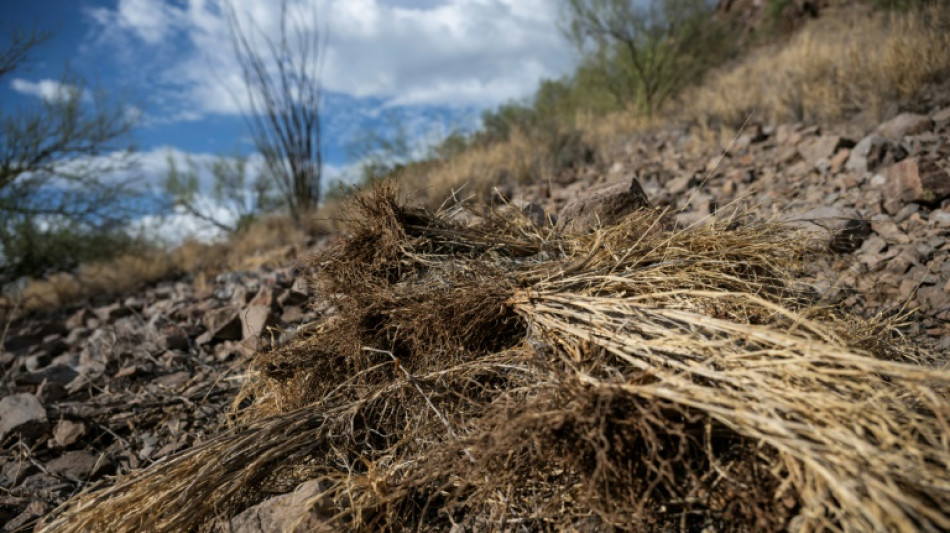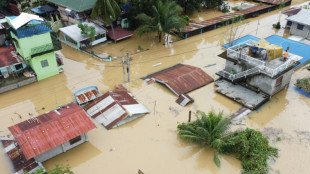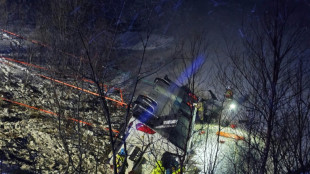
-
 Netflix with Beyonce make splash despite NFL ratings fall
Netflix with Beyonce make splash despite NFL ratings fall
-
Bird flu mutated inside US patient, raising concern

-
 Slovakia says ready to host Russia-Ukraine peace talks
Slovakia says ready to host Russia-Ukraine peace talks
-
Maresca challenges Chelsea to react to Fulham blow

-
 Tech slump slays Santa rally, weak yen lifts Japan stocks higher
Tech slump slays Santa rally, weak yen lifts Japan stocks higher
-
Test records for Zimbabwe and Williams as Afghanistan toil

-
 LawConnect wins punishing Sydney-Hobart yacht race
LawConnect wins punishing Sydney-Hobart yacht race
-
Barca's Yamal vows to 'come back better' after ankle injury

-
 Olmo closer to Barcelona exit after registration request rejected
Olmo closer to Barcelona exit after registration request rejected
-
Watching the sun rise over a new Damascus

-
 Malaysia man flogged in mosque for crime of gender mixing
Malaysia man flogged in mosque for crime of gender mixing
-
Montenegro to extradite crypto entrepreneur Do Kwon to US

-
 Brazil views labor violations at BYD site as human 'trafficking'
Brazil views labor violations at BYD site as human 'trafficking'
-
No extra pressure for Slot as Premier League leaders Liverpool pull clear

-
 Tourists return to post-Olympic Paris for holiday magic
Tourists return to post-Olympic Paris for holiday magic
-
'Football harder than Prime Minister' comment was joke, says Postecoglou

-
 Driver who killed 35 in China car ramming sentenced to death
Driver who killed 35 in China car ramming sentenced to death
-
Bosch gives South Africa 90-run lead against Pakistan

-
 French skier Sarrazin 'conscious' after training crash
French skier Sarrazin 'conscious' after training crash
-
NATO to boost military presence in Baltic after cables 'sabotage'

-
 Howe hopes Newcastle have 'moved on' in last two seasons
Howe hopes Newcastle have 'moved on' in last two seasons
-
German president dissolves parliament, sets Feb 23 election date

-
 Slot says 'too early' for Liverpool title talk
Slot says 'too early' for Liverpool title talk
-
Mayotte faces environment, biodiversity crisis after cyclone

-
 Amorm says 'survival' aim for Man Utd after Wolves loss
Amorm says 'survival' aim for Man Utd after Wolves loss
-
Desertions spark panic, and pardons, in Ukraine's army

-
 China sanctions US firms over Taiwan military support
China sanctions US firms over Taiwan military support
-
World number six Rybakina makes winning start at United Cup

-
 Israeli strikes hit Yemen airport as WHO chief prepares to leave
Israeli strikes hit Yemen airport as WHO chief prepares to leave
-
Swiatek not expecting WADA appeal over doping scandal

-
 'Dangerous new era': climate change spurs disaster in 2024
'Dangerous new era': climate change spurs disaster in 2024
-
Fritz motivated for Slam success after low-key off-season

-
 Move over Mercedes: Chinese cars grab Mexican market share
Move over Mercedes: Chinese cars grab Mexican market share
-
Zverev aiming to challenge Sinner for top ranking

-
 N. Korean soldier captured in Russia-Ukraine war: Seoul
N. Korean soldier captured in Russia-Ukraine war: Seoul
-
Inspired Tsitsipas looking to 'refresh, regroup' in Australia

-
 Seahawks edge Bears to boost NFL playoff hopes
Seahawks edge Bears to boost NFL playoff hopes
-
Thunder NBA win streak at nine as Shai ties career high with 45

-
 India announces state funeral for ex-PM Manmohan Singh
India announces state funeral for ex-PM Manmohan Singh
-
Japan govt approves record budget for ageing population, defence

-
 Japanese shares gain on weaker yen after Christmas break
Japanese shares gain on weaker yen after Christmas break
-
South Korea's acting president faces impeachment vote

-
 Fleeing Myanmar, Rohingya refugees recall horror of war
Fleeing Myanmar, Rohingya refugees recall horror of war
-
Smith century puts Australia in control of 4th Test against India

-
 Israeli strikes hit Yemen as Netanyahu fires warning
Israeli strikes hit Yemen as Netanyahu fires warning
-
Peru ex-official denies running Congress prostitution ring

-
 Australia's Smith reaches 34th Test century
Australia's Smith reaches 34th Test century
-
NHL Red Wings fire Lalonde and name McLellan as head coach

-
 The Bilingual Book Company Launches New, Innovative Bilingual Audiobook App
The Bilingual Book Company Launches New, Innovative Bilingual Audiobook App
-
Injured Halep withdraws from Australian Open

| CMSC | -0.55% | 23.53 | $ | |
| RIO | -0.62% | 58.885 | $ | |
| JRI | -0.91% | 12.09 | $ | |
| BCC | -1.92% | 120.61 | $ | |
| SCS | 0.63% | 11.975 | $ | |
| RBGPF | -1.17% | 59.8 | $ | |
| NGG | 0.56% | 59.25 | $ | |
| RYCEF | -0.69% | 7.2 | $ | |
| BCE | -1.01% | 22.642 | $ | |
| GSK | -0.27% | 34.029 | $ | |
| BTI | -0.4% | 36.285 | $ | |
| VOD | 0.12% | 8.43 | $ | |
| CMSD | -0.46% | 23.3691 | $ | |
| RELX | -0.64% | 45.57 | $ | |
| AZN | -0.51% | 66.18 | $ | |
| BP | 0.33% | 28.945 | $ |

Invasive firestarter: How non-native grasses turned Hawaii into a tinderbox
After a catastrophic wildfire that killed more than 100 people in Hawaii, eyes have turned toward an unexpected culprit: invasive grass species that have spread massively over the archipelago for decades, serving as the perfect fuel.
Drought-resistant, capable of invading difficult terrain, and gradually muscling out local species, they are also a growing threat in the western United States, where devastating fires are increasing.
"Invasive grasses are very ignitable. They change the landscape," Carla D'Antonio, a professor of ecology at the University of California, Santa Barbara told AFP.
"They make conditions that are more conducive to more fire, and all of a sudden, we just have a lot more fire."
Rather than decomposing when they die, they stay "standing there for a long time, dry as a bone," said D'Antonio, who has been studying these species for more than 30 years. They're also hardy, surviving fires better than native species and gradually replacing them.
Most of these grasses -- buffelgrass, Guinea grass, molasses grass -- came from Africa, and were introduced as pasture for cattle, without knowing the danger they would come to represent decades later.
In Hawaii, the demise of sugar cane plantations in the 1990s as a result of globalization had disastrous consequences: huge tracts of land were abandoned, allowing the invasive species an opening.
"Yes, many parts of Hawaii are trending towards dryer conditions, but the fire problem is mostly attributable to the vast extents of non-native grasslands left unmanaged by large landowners as we've entered a 'post-plantation era,'" said Clay Trauernicht, a fire ecologist at the University of Hawaii at Manoa.
Trauernicht said the annual area burned in Hawaii has increased by 300 percent in recent decades.
A 2021 fire prevention report by Maui County described fires as a growing threat due to increasing temperatures and prolonged periods of drought as a result of climate change, and the growing menace of intrusive grasses.
Hawaii, despite its tropical reputation, is getting drier: a 2016 study found 90 percent of the state received less rain compared to a century earlier.
The Maui County report recommended "an aggressive plan to replace these hazardous fuel sources with native plants to reduce combustible fuel while increasing water retention."
- 'Nothing natural about it' -
The problem isn't confined to Hawaii. Over in the mainland United States, "the deserts of the West and the conifer forests, and then the shrub lands in the coastal zone, invasive grasses are here to stay, they're now part of the ecosystem," said D'Antonio.
She herself spends some Saturday evenings weeding roadsides with neighbors in a mountainous area near Santa Barbara, California. Their goal: to prevent a fire from starting from a cigarette butt or an overheating vehicle.
Most of the major fires of the Mojave and Great Basin have been fueled by invasive grasses, she says, while also citing the Camp Fire of 2018, which destroyed the small California town of Paradise, killing more than 80 people. It was started by a power line igniting dry grass.
"(I'm) not making the mistake of calling it a natural disaster because there's almost nothing natural about it," emphasizes the scientist.
One of the invaders, buffelgrass, also threatens the emblematic cactus of the Saguaro National Park in Arizona, by smothering young saguaros and fueling fires in the region. Organizations regularly organize clearing operations. The same species is spreading in Mexico and in Australia.
According to a 2019 study, six invasive grass species caused fire frequency to increase by up to 150 percent in US ecosystems.
For D'Antonio of UC Santa Barbara, tragedies like that of Hawaii are linked to many factors: the alteration of the landscape by humans, the invasion of alien species, droughts made worse by climate change, but also a lack of preparation.
In the American West, widespread logging of conifer forests in the 19th century and a long history of excessive fire suppression in the 20th century contributed to accumulation of tinder on the forest floor.
"The potential for disaster is huge," said D'Antonio, leaving society with daunting questions to address. "How do we plan for the extreme? Not for the average fire, but the extreme fire?"
E.Raimundo--PC




